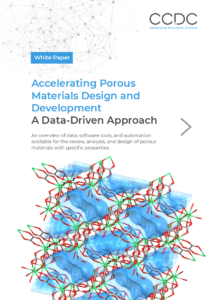Accelerating Porous Materials Design and Development—A Data-Driven Approach
Data, Software, and a Comprehensive Workflow for Advanced Porous Materials Research
Metal–organic frameworks (MOFs) have garnered attention in the porous materials space for the tuneable size and chemical activity of their pores, enabling diverse applications.
The design of novel MOFs, and other porous organic and metal-organic functional materials, requires methods to review existing literature, improve understanding of structure-property relationships, and optimize the development of new materials with targeted properties.

In this white paper you will learn:
- About the Cambridge Structural Database (CSD) and the data it contains for MOFs design and development
- The evidence of how a data-driven approach can accelerate the design of new porous functional materials, with case study examples
- How to perform efficient structural data searching, advanced visualization of porous structures, and in-depth study of void spaces and guest molecules
Who should read:
- Materials scientists – Researching porous organic and metal-organic materials for applications in gas adsorption
- Engineers and industry professionals – Developing and optimizing porous framework materials for industrial applications
- Crystallographers – Analysing crystal structures of porous frameworks and validating experimental findings
- Computational chemists – Using crystal structure data for ML, data mining, and modelling porous materials
Download the White Paper Here
Learn about our data-driven software for functional materials research and development.